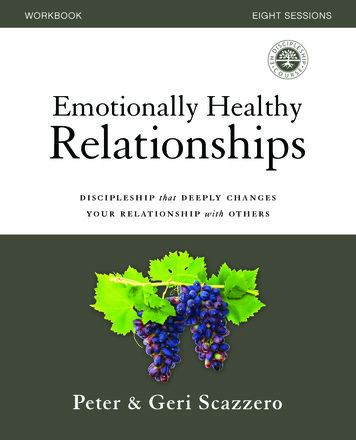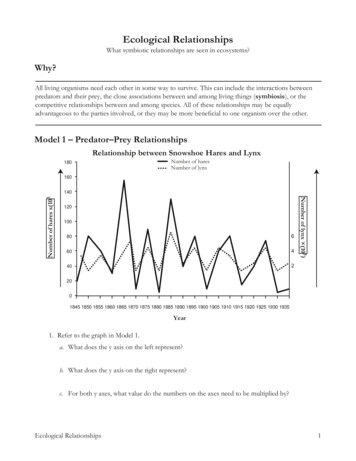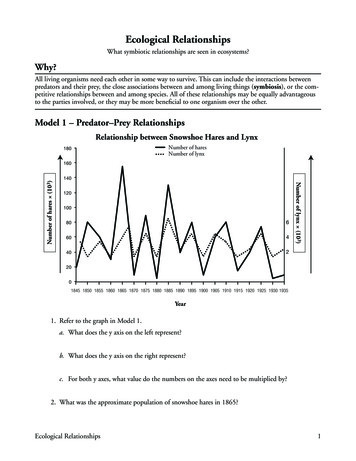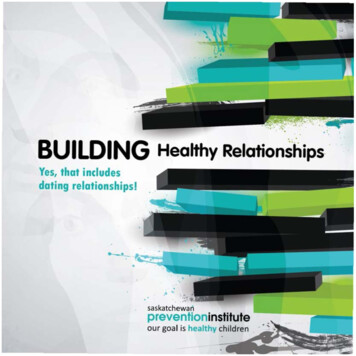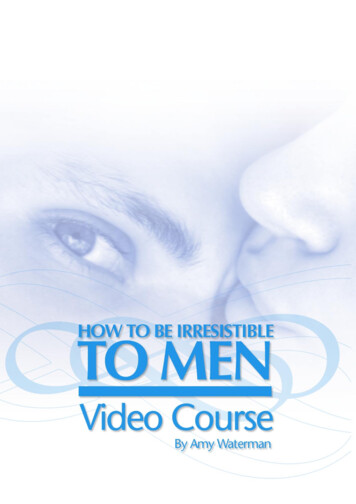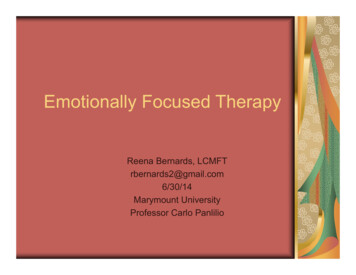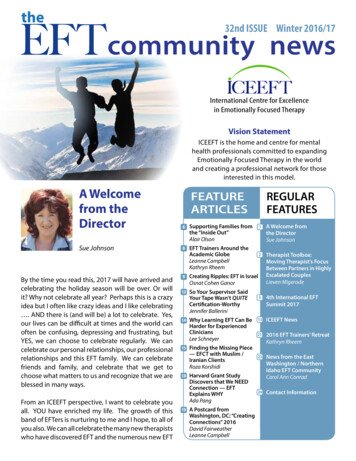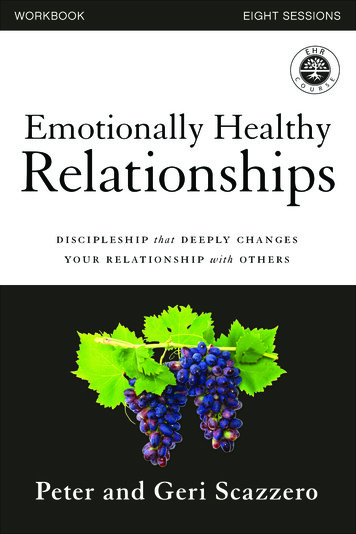
Transcription
Take Your CommunitypTemperature Reading (CTR)Session One9780310081890 EHR Wkbk int SC.indd 157/19/17 2:46 PM
16Emotionally Healthy Relationships WorkbookP R E - S E S S I O N R E A D I N GIt is easy to grow physically into a chronological adult. It is quite another to grow intoan emotional adult. Many people may be, chronologically, a young adult, middle age, orolder, but remain an emotional infant, child, or adolescent.The following diagnostic is a simple tool to help you determine your level of spiritual/emotional maturity.Take a few minutes to reflect on this simple assessment to get a sense of where you areas a disciple of Jesus Christ. It will help you get a sense of whether your discipleship hastouched the emotional components of your life and, if so, how much. It will challengeyou to consider whether you are an emotional infant, child, adolescent or adult. Weencourage you to take the assessment now as you begin The EH Relationships Course, andthen to take it again the completion of the course. This way you will be able to measureany progress you have made.It’s natural to feel uneasy or uncomfortable about some of the questions. Try to be asvulnerable and open as possible. Remember that the inventory will reveal nothing aboutyou that is news to God. Take a moment to pray that God will guide your responses and toremember that you can afford to be honest because he loves you dearly without condition.Because of space limitations, I have kept Part A to a minimum. I suspect most readerswill be far more familiar with the concepts indicated in Part A than in Part B.Note: This inventory can also be taken free online at www.emotionallyhealthy.org.9780310081890 EHR Wkbk int SC.indd 167/19/17 2:46 PM
Take Your Community Temperature Reading (CTR)17NoPART A: General Formation and DiscipleshipSoPlease answer these questions as honestly as possible.Use the scoring method as indicated.t very truemeti mesMotrustlyeVer truey trueEmotional/Spiritual Health Inventory1. I feel confident of my adoption as God’s son/daughter and rarely,if ever, question his acceptance of me.1 2 3 42. I love to worship God by myself as well as with others.1 2 3 43. I spend regular quality time in the Word of God and in prayer.1 2 3 44. I sense the unique ways God has gifted me individually and am activelyusing my spiritual gifts for his ser vice.1 2 3 45. I am a vital participant in a community with other believers.1 2 3 46. It is clear that my money, gifts, time, and abilities are completely atGod’s disposal and not my own.1 2 3 47. I consistently integrate my faith in the marketplace and the world.1 2 3 4 TOTALPART B: Emotional Components of DiscipleshipPrinciple 1: Look beneath the Surface1. It’s easy for me to identify what I am feeling inside (Luke 19:41 – 44;John 11:33 – 35).1 2 3 42. I am willing to explore previously unknown or unacceptable partsof myself, allowing Christ to transform me more fully(Rom. 7:21 – 25; Col. 3:5 – 17).1 2 3 43. I enjoy being alone in quiet reflection with God and myself (Mark 1:35;Luke 6:12).1 2 3 44. I can share freely about my emotions, sexuality, joy, and pain (Ps. 22;Prov. 5:18 – 19; Luke 10:21).1 2 3 45. I am able to experience and deal with anger in a way that leads togrowth in others and myself (Eph. 4:25 – 32).1 2 3 46. I am honest with myself (and a few significant others) about the feelings,beliefs, doubts, pains, and hurts beneath the surface of my life (Ps. 73;88; Jer. 20:7 – 18).1 2 3 4 9780310081890 EHR Wkbk int SC.indd 17TOTAL7/19/17 2:46 PM
NoPrinciple 2: Break the Power of the Pastt very truemeti mesMotrustlyeVer truey trueEmotionally Healthy Relationships WorkbookSo187. I resolve conflict in a clear, direct, and respectful way, not what Imight have learned growing up in my family, such as painful putdowns,avoidance, escalating tensions, or going to a third party rather than tothe person directly (Matt. 18:15 – 18).1 2 3 48. I am intentional at working through the impact of significant “earthquake”events that shaped my present, such as the death of a family member,an unexpected pregnancy, divorce, addiction, or major financial disaster(Gen. 50:20; Ps. 51).1 2 3 49. I am able to thank God for all my past life experiences, seeing how hehas used them to uniquely shape me into who I am (Gen. 50:20; Rom.8:28 – 30).1 2 3 410. I can see how certain “generational sins” have been passed down to methrough my family history, including character flaws, lies, secrets, ways ofcoping with pain, and unhealthy tendencies in relating to others(Ex. 20:5; cf. Gen. 20:2; 26:7; 27:19; 37:1 – 33).1 2 3 411. I don’t need approval from others to feel good about myself(Prov. 29:25; Gal. 1:10).1 2 3 412. I take responsibility and ownership for my past life rather thanblame others (John 5:5 – 7).1 2 3 4 TOTALPrinciple 3: Live in Brokenness and Vulnerability13. I often admit when I’m wrong, readily asking forgiveness from others(Matt. 5:23 – 24).1 2 3 414. I am able to speak freely about my weaknesses, failures, and mistakes(2 Cor. 12:7 – 12).1 2 3 415. Others would easily describe me as approachable, gentle, open, andtransparent (Gal. 5:22 – 23; 1 Cor. 13:1 – 6).1 2 3 416. Those close to me would say that I am not easily offended or hurt(Matt. 5:39 – 42, 1 Cor. 13:5).1 2 3 417. I am consistently open to hearing and applying constructive criticismand feedback that others might have for me (Prov. 10:17; 17:10; 25:12).1 2 3 418. I am rarely judgmental or critical of others (Matt. 7:1 – 5).1 2 3 419. Others would say that I am slow to speak, quick to listen, and good atseeing things from their perspective (James 1:19 – 20).1 2 3 4 9780310081890 EHR Wkbk int SC.indd 18TOTAL7/19/17 2:46 PM
NoPrinciple 4: Receive the Gift of Limits20. I’ve never been accused of “trying to do it all” or of biting off morethan I could chew (Matt. 4:1 – 11).1 2 3 421. I am regularly able to say “no” to requests and opportunities ratherthan risk overextending myself (Mark 6:30 – 32).1 2 3 422. I recognize the different situations where my unique, God-givenpersonality can be either a help or hindrance in respondingappropriately (Ps. 139; Rom. 12:3; 1 Peter 4:10).1 2 3 423. It’s easy for me to distinguish the difference between when to helpcarry someone else’s burden (Gal 6:2) and when to let it go so theycan carry their own burden (Gal. 6:5).1 2 3 424. I have a good sense of my emotional, relational, physical, and spiritualcapacities, intentionally pulling back to rest and fill my “gas tank” again(Mark 1:21 – 39).1 2 3 425. Those close to me would say that I am good at balancing family, rest,work, and play in a biblical way (Ex. 20:8).1 2 3 4 19t very truemeti mesMotrustlyeVer truey trueTake Your Community Temperature Reading (CTR)SoTOTALPrinciple 5: Embrace Grieving and Loss26. I openly admit my losses and disappointments (Ps. 3; 5).1 2 3 427. When I go through a disappointment or a loss, I reflect on how I’mfeeling rather than pretend that nothing is wrong (2 Sam. 1:4, 17 – 27;Ps. 51:1 – 17).1 2 3 428. I take time to grieve my losses as David (Ps. 69) and J esus did(Matt. 26:39; John 11:35; 12:27).1 2 3 429. People who are in great pain and sorrow tend to seek me out becauseit’s clear to them that I am in touch with the losses and sorrows in myown life (2 Cor 1:3 – 7).1 2 3 430. I am able to cry and experience depression or sadness, explore thereasons behind it, and allow God to work in me through it(Ps. 42; Matt. 26:36 – 46).1 2 3 4 9780310081890 EHR Wkbk int SC.indd 19TOTAL7/19/17 2:46 PM
NoPrinciple 6: Make Incarnation Your Model for Loving Wellt very truemeti mesMotrustlyeVer truey trueEmotionally Healthy Relationships WorkbookSo2031. I am regularly able to enter into other people’s world and feelings,connecting deeply with them and taking time to imagine what itfeels like to live in their shoes (John 1:1 – 14; 2 Cor. 8:9; Phil. 2:3 – 5).1 2 3 432. People close to me would describe me as a responsive listener(Prov. 10:19; 29:11; James 1:19).1 2 3 433. When I confront someone who has hurt or wronged me, I speak morein the first person (“I” and “me”) about how I am feeling rather thanspeak in blaming tones (“you” or “they”) about what was done(Prov. 25:11; Eph. 4:29 – 32).1 2 3 434. I have little interest in judging other people or quickly giving opinionsabout them (Matt. 7:1 – 5).1 2 3 435. People would describe me as someone who makes “loving well” mynumber one aim (John 13:34 – 35; 1 Cor. 13).1 2 3 4 TOTALPrinciple 7: Slow Down to Lead with Integrity36. I spend sufficient time alone with God to sustain my work for God.1 2 3 437. I regularly take a 24-hour period each week for Sabbath-keeping —to stop, to rest, to delight, and to contemplate God.1 2 3 438. Those closest to me would say that my marriage and children takepriority over church ministry and others.1 2 3 439. I am not afraid to ask difficult, uncomfortable questions, to myself or toothers, when needed.1 2 3 440. I do not divide my leadership into sacred/secular categories. I treat theexecutive/planning functions of leadership as meaningful as prayerand preparing sermons.1 2 3 4 9780310081890 EHR Wkbk int SC.indd 20TOTAL7/19/17 2:46 PM
Take Your Community Temperature Reading (CTR)21Inventory ResultsFor each group of questions on pages 17 – 20: Add your answers to get the total for that group. Write your totals on the top portionof page 22, as the sample at the bottom of this page illustrates. Next, plot your answers and connect the dots to create a graph on the middle portionof page 22, again following the sample on this page. Finally, see page 23 for interpretations of your level of emotional health in each area.What patterns do you discern?SAMPLEPart AQuestionsTotal1–724/28Principle 1 – Look beneath the Surface1–620/24Principle 2 – Break the Power of the Past7 – 1211/24Principle 3 – Live in Brokenness and Vulnerability13 – 1912/28Principle 4 – Receive the Gift of Limits20 – 2514/24Principle 5 – Embrace Grieving and Loss26 – 3016/20Principle 6 – Make Incarnation Your Model for Loving Well31 – 3514/20Principle 7 – Slow Down to Lead with Integrity36 – 4015/20General Formation and DiscipleshipPart B9780310081890 EHR Wkbk int SC.indd 217/19/17 2:46 PM
22Emotionally Healthy Relationships WorkbookQuestionsTotal1–7/28Principle 1 – Look beneath the Surface1–6/24Principle 2 – Break the Power of the Past7 – 12/24Principle 3 – Live in Brokenness and Vulnerability13 – 19/28Principle 4 – Receive the Gift of Limits20 – 25/24Principle 5 – Embrace Grieving and Loss26 – 30/20Principle 6 – Make Incarnation Your Model for Loving Well31 – 35/20Principle 7 – Slow Down to Lead with Integrity36 – 40/20Part AGeneral Formation and DiscipleshipPart BAP1 P2 P3 P4 P5 P6 P72824 24 28 24 20 20 202320 20 23 20 17 17 17emotional adolescent1715 15 17 15 13 13 13emotional child1210 10 12 10999emotional infant76555emotional adult9780310081890 EHR Wkbk int SC.indd 226767/19/17 2:46 PM
Take Your Community Temperature Reading (CTR)23Interpretation Guide: Levels of Emotional Maturity1Emotional infant. I look for other people to take care of me emotionally and spiritually.I often have difficulty in describing and experiencing my feelings in healthy ways and rarelyenter the emotional world of others. I am consistently driven by a need for instant gratification, often using others as objects to meet my needs. P eople sometimes perceive me asinconsiderate and insensitive. I am uncomfortable with silence or being alone. When trials,hardships, or difficulties come, I want to quit God and the Chris tian life. I sometimes experience God at church and when I am with other Chris tians, but rarely when I am at work.Emotional child. When life is going my way, I am content. However, as soon as disappointment or stress enter the picture, I quickly unravel inside. I often take things personally, interpreting disagreements or criticism as a personal offense. When I don’t get my way, I oftencomplain, throw an emotional tantrum, withdraw, manipulate, drag my feet, become sarcastic, or take revenge. I often end up living off the spirituality of other people because I am sooverloaded and distracted. My prayer life is primarily talking to God, telling him what to doand how to fix my problems. Prayer is a duty, not a delight.Emotional adolescent. I don’t like it when others question me. I often make quick judgmentsand interpretations of people’s behavior. I withhold forgiveness to those who sin againstme, avoiding or cutting them off when they do something to hurt me. I subconsciously keeprecords on the love I give out. I have trouble really listening to another person’s pain, disappointments, or needs without becoming preoccupied with myself. I sometimes find myselftoo busy to spend adequate time nourishing my spiritual life. I attend church and serve othersbut enjoy few delights in Christ. My Chris tian life is still primarily about doing, not being withhim. Prayer continues to be mostly me talking with little silence, solitude, or listening to God.Emotional adult. I respect and love others without having to change them or becomingjudgmental. I value p eople for who they are, not for what they can give me or how theybehave. I take responsibility for my own thoughts, feelings, goals, and actions. I can state myown beliefs and values to those who disagree with me — without becoming adversarial. I amable to accurately self-assess my limits, strengths, and weaknesses. I am deeply convincedthat I am absolutely loved by Christ and, as a result, do not look to others to tell me I’m okay.I am able to integrate doing for God and being with him (Mary and Martha). My Chris tian lifehas moved beyond simply serving Christ to loving him and enjoying communion with him.Permission is granted for any purchaser of this book to make copies of this inventoryas long as it is not changed or sold for a profit, and this credit is included: Takenfrom Pete Scazzero with Warren Bird, The Emotionally Healthy Church: Updated andExpanded Edition (Grand Rapids: Zondervan, 2009). For more information and furtherresources, contact www.emotionallyhealthy.org.9780310081890 EHR Wkbk int SC.indd 237/19/17 2:46 PM
GROUP MEETINGDaily Office(10 minutes)Do one of the Daily Offices from Week 1 of Emotionally HealthyRelationships Day by Day to begin your session. (Leaders, pleasesee point number two in the “General Guidelines” on page 160.)Introduction(2 minutes)The essence of true Christian spirituality is to love well. This requiresthat we experience connection with God, with ourselves, and withother people. God invites us to practice his presence in our daily lives.At the same time, he invites us to “practice the presence of people,” within an awareness ofhis presence, in our daily relationships. Sadly, the two are rarely brought together.2The Christians in the church in Corinth failed to make that connection. They werezealous, diligent, and absolutely committed to having God as Lord of their lives. They hadthe faith to move mountains, gave great amounts of money to the poor, and were incrediblygifted, but they did not love people. They did not link loving God to loving people.Jesus always integrated the presence of God with the practice of loving people. He summarized the entire Bible for us in light of this unbreakable union: “ ‘Love the Lord your Godwith all your heart and with all your soul and with all your mind.’ This is the first and greatestcommandment. And the second is like it: ‘Love your neighbor as yourself.’ All the Law andthe Prophets hang on these two commandments” (Matthew 22:37–40).249780310081890 EHR Wkbk int SC.indd 247/19/17 2:46 PM
Take Your Community Temperature Reading (CTR)Growing Connected25(10 minutes)1. Take a minute each to share your name, what you hope to get out of this course, andwhat makes you feel fully alive.Bible Study(10 minutes)The Corinthian church was a gifted, influential, intelligent (high IQ— intellectual intelligence) church that was weak in its ability to love well (low EQ— emotional intelligence).Read aloud 1 Corinthians 13:1–3:If I speak in the tongues of men or of angels, but do not have love, I am only a resoundinggong or a clanging cymbal. If I have the gift of prophecy and can fathom all mysteriesand all knowledge, and if I have a faith that can move mountains, but do not have love,I am nothing. If I give all I possess to the poor and give over my body to hardship thatI may boast, but do not have love, I gain nothing.2. How do you understand the words, “If I have the gift of prophecy and can fathom allmysteries and all knowledge, and if I have a faith that can move mountains, but havenot love, I am nothing” (emphasis added)?3. How might this passage clash with your understanding of spiritual maturity?9780310081890 EHR Wkbk int SC.indd 257/19/17 2:46 PM
26Emotionally Healthy Relationships Workbook4. As you think back over the past week, can you give one or two examples of how youseparated your love for God from your love for people?VIDEO: Take Your Community Temperature Reading(20 minutes)Video NotesSomething Was Wrong; Something Was Missing People were growing in their love for God, but it wasn’t translating into their lovefor other people. The quality of love inside the church was not really that different from the qualityof love outside the church. We hit this wall. What is missing in our spiritual formation/discipleship and the way we handleour relationships?We Call This Emotionally Healthy Spirituality Emotional health and spiritual maturity are inseparable. It is not possible to bespiritually mature while remaining emotionally immature.“Love the Lord your God with all your heart and with all your soul and withall your mind.” . . . And the second is like it: “Love your neighbor as yourself.”(Matthew 22:37–39) Loving God and loving others is the essence of true spirituality.If I speak in the tongues of men or of angels, but do have not love . . . and ifI have a faith that can move mountains, but do have not love, I am nothing.(1 Corinthians 13:1–2) Paul links true spirituality with our ability to love other people well. We need to give people the skills to “do” the Bible.9780310081890 EHR Wkbk int SC.indd 267/19/17 2:46 PM
Take Your Community Temperature Reading (CTR)27 Every Christian needs practical skills in order to grow into emotional/spiritualadulthood. To get these skills you must experience or practice them.Eight Emotionally Healthy Skills1.2.3.4.5.6.7.8.The Community Temperature Reading (CTR)Stop Mind Reading and Clarify ExpectationsGenogram Your FamilyExplore the IcebergListen Incarnationally (or Incarnational Listening)Climb the Ladder of IntegrityFight Cleanly (or Clean Fighting)Develop a “Rule of Life” to Implement Emotionally Healthy SkillsThe EH Discipleship CoursesRELATIONSHIPS IN THE NEW FAMILY OF JESUSFROMBROKENNESS(GENESIS 3)DefensiveLow Self-AwarenessIsolationWHOLENESS(GENESIS 1 & 2)ApproachabilityHigh Self-AwarenessNon-ReactivityBlameTaking 10081890 EHR Wkbk int SC.indd 27TOWARDCourageOffering Self as GiftAddictionFreedomDishonestyHonesty7/19/17 2:46 PM
28Emotionally Healthy Relationships WorkbookCommunity Temperature Reading (CTR): What Is It? This is the building block for the rest of the skills that follow. The purpose: To discover and express your God- given voice and to build healthyrelationships with others. It’s about brief sharing.The Five Categories1. Appreciations We think them in our heads but often only say them when someone has goneabove and beyond the call of duty. Some families and cultures never express appreciations. Appreciations are important to the life of any community or relationship.e.g., “I appreciate you waiting for me last night when I was running late.”e.g., “I appreciate you arriving early and getting the coffee ready beforethe meeting.”2. Puzzles We use them when we don’t want to make negative assumptions aboutpeople, especially when we don’t have all the information. Puzzles prevent us from jumping to conclusions and negatively interpretingwhat is going on around us. Puzzles give us an opportunity to slow down and ask questions instead ofmaking judgments. Puzzle is a loving word.e.g., Instead of being upset and not saying anything at all or angrilysaying, “Why didn’t you return my phone call?” you can say, “I’m puzzledas to why you didn’t return my phone call.”e.g., Instead of thinking, No one washed the dishes last night. I live witha bunch of slobs! you can say, “I’m puzzled as to why you left your dirtydishes in the sink last night.”9780310081890 EHR Wkbk int SC.indd 287/19/17 2:46 PM
Take Your Community Temperature Reading (CTR)293. Complaints with Possible Solutions All relationships have complaints or things they don’t like. This is normal. Two challenges with complaints: (1) Some of our families grew up with anunwritten rule: If you don’t have anything nice to say, don’t say anything at all.(2) It is very easy to complain and not take any responsibility for a possible solution. The purpose of “Complaints with Possible Solutions” is to help you withsmall irritations and annoyances that arise each day. Use the phrase “I notice . . . and I prefer . . .”3e.g., “I notice you often leave the lights on in our apartment when youleave, and I prefer you turn them off.”e.g., “I notice our meetings start late, and I prefer we start at the agreedupon time.” The person with the complaint takes responsibility for a possible solution. Keep complaints light in the Community Temperature Reading.4. New Information This can take many forms— events, appointments, new decisions,achievements, opportunities, or activities. Relationships can only grow whenpeople know what is happening in each other’s lives, both the trivial as well asthe important.e.g., “Our professor moved the exam so I can go to the movies this week.”e.g., “I’m exploring a different job within my company!”5. Hopes and Wishes Hopes and wishes offer windows into our unique souls, revealing significantparts of who we are. Family life in particular becomes richer as we support and listen to eachother’s hopes and dreams.e.g., “I hope we can get away for vacation this year.”e.g., “I hope to get a master’s degree in nursing someday.”9780310081890 EHR Wkbk int SC.indd 297/19/17 2:46 PM
30Emotionally Healthy Relationships WorkbookPete and Geri Model a CTR Adapted and used with permission from the Virginia SatirGlobal Network, www.satir global .org. All rights reserved.Pause the Video9780310081890 EHR Wkbk int SC.indd 307/19/17 2:46 PM
Workbook ActivitiesTake Your Community Temperature Reading (CTR)31(25 minutes)Partner Activity: CTR (10 minutes)1. Pair up with one other person— or with two others if there is an uneven numberin your group.2. Review the Guidelines for the CTR: Face each other as you share. Take turns sharing back and forth. Keep sharing light and brief. Use only the sentence stems given. Do not interrupt or respond. Only respond to puzzles or complaints with afew words if appropriate.3. Using the graphic of the Community Temperature Reading on page 30, begin atthe bottom of the thermometer, with “Appreciations,” and take turns.4. Work on only one category at a time. Feel free to skip a category if nothing comesto your mind.5. Keep it light, especially with the “Complaints and Possible Solutions.”Small Group Sharing (10 minutes)In groups of three or four:5. How did your family of origin share appreciations? Complaints? Hopes and wishes?6. What was it like for you to express yourself in these different categories?7. Which was easiest for you? Which was most difficult for you?9780310081890 EHR Wkbk int SC.indd 317/19/17 2:46 PM
32Emotionally Healthy Relationships WorkbookVIDEO: Closing Summary(6 minutes)Video NotesHealthy ways of relating clash with most families and cultures. This is one practicalway to put off the old self and put on the new self in Christ (Ephesians 4:22–24).The CTR is a flexible, elastic tool that can be used one- on- one or in a group setting.It can be used with children/families, with friends, at the workplace, in classrooms, orin a small group.How it is used is dependent on two factors:1. Time: How much time do you have? Feel free to use only one or two elementsif time is limited.2. Environment: If there is a lot of tension in the group, you may want to skip“Complaints and Possible Solutions.”Remember, the CTR is meant to be used as a tool, not a weapon.Practice the Community Temperature Reading two to three times a week throughoutthe course.Conclusion: When we try to love in our own strength, we discover we can’t. Wenaturally fall back to unhealthy ways of relating, especially under stress. We needJesus’ love to flow into us if it is to flow out of us.That is why developing and deepening your relationship with Jesus by using EHRelationships Day by Day is core to this course.9780310081890 EHR Wkbk int SC.indd 327/19/17 2:46 PM
Take Your Community Temperature Reading (CTR)Optional Session Wrap- up33(5 minutes)Together with your small group, ask any questions of clarification regarding this session andthen briefly close in prayer.PE R SO N A L AC T I O N S T E PDecide when you will practice this skill before the next session. (We recommendtwo to three times.) Write your response below.I plan on practicing the CTR:With whom?When?9780310081890 EHR Wkbk int SC.indd 337/19/17 2:46 PM
pBetween- Sessions Personal StudySession OneRead the pre- session assignment for Session 2 on pages 40– 42. Use the space provided tonote any insights or questions you might want to bring to the next group session.Prayerfully read Week 1 of the Emotionally Healthy RelationshipsDay by Day devotional, “Take Your Community TemperatureReading.” Use the space provided to answer the Questions toConsider and/or to journal your thoughts each day.DAY 1 Questions to Consider:When can you set aside uninterrupted time each day to begincultivating an awareness of the presence of God?349780310081890 EHR Wkbk int SC.indd 347/19/17 2:46 PM
pTake Your Community Temperature Reading (CTR)Whose beauty might you be bypassing because you are too busy or distracted?DAY 2 Questions to Consider:In what areas of life might your pursuit of “getting things done” or “doing right things”be more important to you than seeking a loving relationship with God and others?35Consider your present balance between solitude and community. To what degree is itadequate for you to be growing in love for God, others, and yourself ?9780310081890 EHR Wkbk int SC.indd 357/19/17 2:46 PM
p36Emotionally Healthy Relationships WorkbookDAY 3 Questions to Consider:What difference might it make in your day to remember that, in every moment you turnyour heart to God— including this very moment— he is waiting for you and loving you first?Think back over the last few days. In what way(s) did your to- do list, distractibility,or perfectionism keep you from loving and enjoying Jesus or the people around you?DAY 4 Questions to Consider:In what subtle or perhaps even unconscious ways might you be judging or despisingsomeone in your life?9780310081890 EHR Wkbk int SC.indd 367/19/17 2:46 PM
pTake Your Community Temperature Reading (CTR)37In your own life, how might it be true that falling in love with Jesus and staying in love withJesus will decide everything? How could it change you, as well as your relationships?DAY 5 Questions to Consider:What two or three things from the past week are you most thankful for? (For example,good health or healing, people in your life, possessions, opportunities, trials, closed doors,spiritual blessings, etc.) Express your heartfelt gratitude to God for these gifts.What is your biggest challenge in integrating these two loves in this season of your life?9780310081890 EHR Wkbk int SC.indd 377/19/17 2:46 PM
18 Emotionally Healthy Relationships Workbook Principle 2: Break the Power of the Past 7. I resolve conflict in a clear, direct, and respectful way, not what I might have learned growing up in my family, such as painful putdowns, avoidance, escalating tensions, or going to a third par

